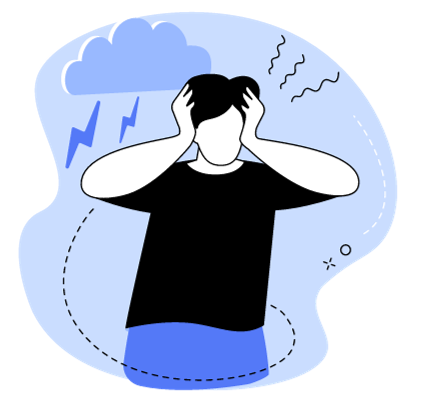Estimated reading time: 16 minutes
Exams can be daunting, can’t they? Test anxiety is a common psychological phenomenon affecting individuals preparing for it, especially during the Pearson Test of English (PTE). This test can pave the way for academic and migration opportunities.
Test anxiety can significantly impact PTE candidates, causing stress, reduced performance, and hindered language abilities, ultimately affecting their ability to achieve the desired scores on the test.
Understanding Test Anxiety : What is it, What are its Symptoms?
So, what is test anxiety? It’s that gnawing feeling of dread or panic as the test day approaches. Symptoms can range from mild nervousness to severe physical and emotional reactions, such as rapid heartbeat, excessive sweating, and negative thoughts.
Common Symptoms of Test Anxiety:
- Physical Symptoms: Test anxiety can manifest as physical discomfort, including nausea, sweaty palms, trembling, rapid heartbeat, headaches or even panic attacks.
- Cognitive Symptoms: Test-anxious individuals often have racing thoughts, difficulty concentrating, and negative self-talk.
- Emotional Symptoms: Anxiety can lead to various negative emotions, such as fear, dread, apprehension, and self-doubt.
- Behavioural Symptoms: People with test anxiety may exhibit avoidance behaviours, procrastination, or over studying to alleviate stress.
Causes of Test Anxiety:
- Fear of Failure: The fear of not meeting personal or societal expectations and the potential consequences of failing can trigger test anxiety.
- Perfectionism: High standards and the need to excel in every aspect of a test can create anxiety.
- Lack of Preparation: Insufficient preparation or confidence in knowledge can result in test anxiety. Performance Pressure: External pressures from parents, teachers, or employers can increase test anxiety. The stress of disappointment can be overwhelming.

The Importance of Managing Test Anxiety
Test anxiety isn’t just about feeling jittery. It can hinder your PTE performance, cloud your judgement, and adversely affect your scores.
Impact of Test Anxiety on PTE Performance:
Test anxiety can have a detrimental effect on a PTE candidate’s performance in several ways:
- Reduced Concentration: Anxiety can lead to difficulty focusing on the test questions, causing candidates to misread or misunderstand the items.
- Impaired Cognitive Function: Anxiety can interfere with cognitive processes, leading to memory lapses, confusion, and difficulty recalling information or language skills.
- Time Management Problems: Anxious test-takers may rush through questions or spend excessive time on a single question, resulting in incomplete sections and potentially lower scores.
- Diminished Language Skills: Anxiety can hinder a candidate’s ability to express themselves effectively in English, leading to poor performance in speaking and writing tasks.
Significance of Addressing Test Anxiety for Optimal PTE Results:
Addressing test anxiety is crucial for achieving optimal results in the PTE for several reasons:
- Improved Performance: Managing anxiety can help candidates perform at their actual skill level.
- Time Management: Anxiety management strategies can help test-takers allocate their time effectively during the test,
- Confidence Building: Reducing anxiety fosters self-assurance, which is essential for success in the PTE.
Enhanced Communication Skills: Anxiety management allows candidates to express themselves more clearly, showcasing their language skills better in the speaking and writing tasks.
Effective Test Anxiety Management Strategies: Preparation is Key
Eradicating test anxiety might seem like a tall order, but with the right strategies, it’s feasible.
Preparation is Key:
You know the adage, “Fail to prepare, prepare to fail.” Having a robust study schedule and relying on trustworthy study resources can bolster your confidence. Here’s why preparation is critical:
- Builds Confidence: A solid knowledge base and ample practice instil confidence in your abilities, reducing self-doubt and anxiety.
- Familiarity with Test Format: Preparing ensures you are well-acquainted with the test format, types of questions, and time constraints, making the actual test experience less intimidating.
- Time Management: Adequate preparation allows you to develop effective time management strategies. It ensures you can complete all sections of the test without feeling rushed.
- Reduces Fear of the Unknown: A well-prepared candidate is less likely to be surprised by unfamiliar questions or tasks.
Tips on Creating a Study Schedule and Using Reliable Study Materials:
- Set Clear Goals: Define your target PTE score and break it into smaller, manageable goals for each skill area (reading, writing, listening, speaking).
- Establish a Study Schedule: Create a detailed study schedule that outlines when and what you will study.
- Consistency is Key: Stick to your study schedule consistently.
- Review and Reflect: After completing practice questions and tests, review your answers and identify areas where you need improvement. Focus on strengthening weak points.
- Simulate Test Conditions: Practice under test-like conditions. Sit in a quiet room, time yourself, and adhere to the test’s rules. It helps acclimate you to the test environment.
- Use Official Prep Materials: Utilise the official PTE material. You will get a clear understanding of the tasks you will face in the test. You will also get familiar with the strategies to answer questions.
Stress-Reduction Techniques: How Can These Techniques Help You
Just a few minutes of mindfulness can help centre your thoughts and keep anxiety at bay.
- Deep Breathing Exercises:
- Technique: Find a quiet place, sit or lie comfortably, and close your eyes. Take a slow, deep breath through your nose, counting to four. Hold your breath for a couple of seconds. Exhale slowly through your mouth for a count of four. Repeat this several times.
- How It Helps: Deep breathing triggers the body’s relaxation response by slowing your heart rate, reducing muscle tension, and calming the mind.
- Progressive Muscle Relaxation:
- Technique: Start at your toes and work up, systematically tensing and then releasing each muscle group.
- How It Helps: This technique helps reduce physical tension and promotes relaxation.
- Mindfulness Meditation:
- Technique: Find a quiet space, sit comfortably, and focus on your breath or a specific aspect of the present moment.
- How It Helps: Mindfulness meditation helps you stay grounded and present, reducing racing thoughts and anxiety.
- Yoga and Stretching:
- Technique: Engage in gentle yoga poses or stretching exercises to release physical tension.
- How It Helps: Yoga and stretching help relax your muscles, improve blood circulation, and reduce physical symptoms of anxiety.
Positive Self-Talk: Examples of Constructive Self-Talk
Replace thoughts like “I can’t do this” with “I am prepared, and I can handle this.” Positive affirmations can set the tone for a confident performance.
The Power of Positive Affirmations:
Positive affirmations are statements or phrases you can repeat to yourself to promote a positive mindset, build self-confidence, and reduce anxiety. By incorporating positive affirmations into your test preparation and test-taking routine, you can harness their power to boost confidence and manage test anxiety effectively.
Examples of Constructive Self-Talk to Boost Confidence:
- Affirmation: “I am well-prepared for this test.”
- Explanation: This affirmation reinforces your readiness and can help counter feelings of inadequacy.
- Affirmation: “I am confident in my English language skills.”
- Explanation: Focusing on your language proficiency can enhance your self-assurance in performing well in the PTE.
- Affirmation: “I am calm and focused under pressure.”
- Explanation: This affirmation encourages a mindset of composure, which is crucial for effective test-taking.

Time Management: Its Importance And Exclusive Strategies For Allocating Time
During the test, efficiently managing time can alleviate stress. Familiarise yourself with the test format and practice allocating time judiciously.
Importance of Time Management During the Test:
Effective time management during the test is crucial for several reasons:
- Completion of All Sections: Time management ensures adequate time to complete all test sections.
- Optimal Resource Allocation: Properly managing time allows you to allocate more time to sections where you may need it most,
- Reduction of Anxiety: Being aware of the time and pacing yourself can reduce anxiety and the feeling of being rushed, which can negatively impact your performance.
Strategies for Allocating Time Effectively:
- Familiarise Yourself with the Test Format: Before the test, thoroughly understand the structure of the PTE, including the number of sections and the time limits for each.
- Set Time Goals for Each Section: Divide the available time by the number of questions in each section to determine a rough time limit for each question.
- Practice Time Management: Practice time management by taking practice tests under realistic time constraints in your test preparation. It will help you refine your skills.
Healthy Lifestyle Choices and Practical Tips for Maintaining It
Maintaining a healthy lifestyle can play a significant role in reducing stress, including test anxiety.
- Healthy Diet:
- A nutritious diet provides the body and mind with essential nutrients for optimal functioning.
- Proper nutrition supports brain function, memory, and cognitive performance, reducing anxiety and enhancing focus.
- Regular Exercise:
- Physical activity releases endorphins, the body’s natural stress reducers, promoting a positive mood.
- Regular workouts enhance overall physical and mental health, improving one’s ability to handle stress.
- Adequate Sleep:
- Quality sleep is mandatory for cognitive function, memory consolidation, and emotional regulation.
- Lack of sleep can cause increased stress, anxiety, and irritability, while sufficient sleep promotes emotional stability and resilience.
Practical Tips for Maintaining a Healthy Lifestyle:
- Eat a Balanced Diet:
- Consume various fruits, vegetables, whole grains, lean proteins, and healthy fats.
- Avoid excessive caffeine, sugar, and processed foods, leading to energy crashes and mood swings.
3. Stay Hydrated:
- Hydration is crucial for your overall health and mental clarity. Drink plenty of water throughout the day.
4. Manage Stress Through Relaxation Techniques:
- Add relaxation techniques, like deep breathing and meditation, into your daily activities to reduce stress.
5. Seek Professional Help:
- Consult a counsellor for guidance and support if stress and anxiety persist despite lifestyle changes.
Simulated Test-Taking: Its Benefits For Reducing Your Anxiety
Ever thought of giving the PTE a test run before the real deal? Engaging in simulated test-taking by diving into practice tests offers a valuable sneak peek into the PTE arena.
Benefits of Mock Exams in Reducing Anxiety:
- Familiarity with Test Format: Practice tests replicate the PTE format, including the types of questions, time limits, and the test structure. Becoming familiar with the format reduces uncertainty and anxiety about what to expect on test day.
- Time Management Practice: Mock exams provide opportunities to practise time management and pacing. You can refine your strategies for allocating time to each section by simulating actual testing conditions.
- Assessment of Current Skills: Practice tests help assess your current skill level and identify areas that may require more attention in your preparation.
- Confidence Building: Completing practice tests and seeing your progress can boost your confidence.
- Error Analysis and Improvement: Reviewing your performance lets you identify your strengths and weaknesses.
Test Day Tips: Your Checklist For Confidence
The test day doesn’t have to feel like walking into a lion’s den, especially if you’re armed with a robust plan. Here’s a quick checklist for your big day:
Before Test Day:
- Confirm Your Test Details:
- Double-check the test date, time, and location.
- Review any specific requirements or guidelines provided by the test centre.
- Valid Identification:
- Ensure you have a valid passport or a national identification card.
- Admission Ticket:
- Have a printed or digital copy of your PTE admission ticket, which you received upon registration.
- Restful Sleep:
- Get a good night’s sleep before the test to ensure you are well-rested and alert.
On Test Day:
- Arrive Early:
- Arrive at least 30 minutes before your scheduled test time at the test centre.
- ID and Admission Ticket:
- Present your valid ID and admission ticket to the test centre staff for verification.
- Security Procedures:
- Expect security measures, including ID checks and biometric scans.
- Test Materials:
- The test centre will provide materials such as pencils and scratch paper if needed.
- Instructions:
- Listen carefully to the test centre staff for instructions on test procedures and room etiquette.
Post-Test Debriefing: How To Learn From Your Experience
After the test winds down, celebrating or wallowing is tempting, depending on how you think you did. But pause for a moment of reflection.
Here’s how to conduct a post-test debrief:
- Review Your Test Performance: Start by reviewing your overall performance on the test. Consider how you felt during the test and your immediate impressions about your performance.
- Analyse Your Strengths and Weaknesses: Identify the sections or question types where you felt most comfortable and those where you encountered challenges.
- Review Your Time Management: Assess how well you managed your time during the test.
Learning from the Experience and Making Improvements:
After reflecting on your test experience, use the following advice to learn from the experience and make improvements:
- Identify Areas for Improvement: Based on your analysis, pinpoint the areas you need to improve. It could include language skills, time management, or managing test anxiety.
- Develop a Study Plan: Create a targeted study plan to address your weaknesses. Allocate more time to the areas that need improvement and use effective study materials.
- Practice Regularly: A consistent approach is critical to improving your performance. Focus on practice questions and tasks related to your weak points.
- Time Management Strategies: If time management was an issue, refine your time management strategies by practising under timed conditions in your study sessions.
- Seek Professional Help: If you find that test anxiety or specific language skills are significant obstacles, consider seeking guidance from a test prep tutor or a mental health professional.
Seeking Professional Help: When To Seek It And Why?
Let’s face it: sometimes, test anxiety feels too heavy to lift independently. If those feelings become too overwhelming or debilitating, it might be time to call the experts.
When to Seek Help for Severe Test Anxiety:
It is advisable to seek help from a counsellor or therapist for severe test anxiety when the following conditions apply:
- Persistent and Overwhelming Anxiety: If test anxiety is consistently overwhelming, negatively impacting your test performance and interfering with your daily life, it may be time to seek help.
- Physical Symptoms: When test anxiety leads to severe physical symptoms like panic attacks, nausea, or trembling that significantly affect your well-being,
- Interference with Daily Functioning: If test anxiety hinders your engagement in daily activities or social interactions, it is a sign that the stress has become debilitating.
- Ineffectiveness of Self-Help Strategies: Professional guidance may be necessary when self-help strategies and techniques have not proven effective in managing test anxiety.
Benefits of Professional Guidance:
Seeking help from a counsellor or therapist for severe test anxiety can offer several benefits:
- Individualised Assessment: A qualified professional can assess the nature and extent of your test anxiety, helping to pinpoint its root causes and triggers.
- Personalised Treatment Plan: They can develop a tailored treatment plan to address your needs.
- Anxiety Reduction: Therapists are equipped to provide strategies and tools for managing and reducing test anxiety, enabling you to cope more effectively.
- Skills Building: They can help you build coping skills, enhance emotional regulation, and improve your overall emotional well-being.
Success Stories and Inspirational Examples
There’s nothing like real-life stories to shine a beacon of hope and inspiration. Let’s dive into a couple of these transformative journeys of individuals who wrestled with test anxiety and emerged victorious in their PTE exams:
The Story of Maria:
Maria, a non-native English speaker, aspired to study abroad and needed a high score on the PTE to meet the language requirements for her dream university. However, test anxiety was a significant hurdle for her. She would become extremely nervous leading up to the test, and her anxiety manifested as physical symptoms during the exam, causing her to underperform.
Determined to overcome her test anxiety, Maria decided to take a multi-faceted approach:
- Professional Help: Maria sought the assistance of a cognitive-behavioural therapist who specialised in anxiety and performance issues.
- Comprehensive Test Prep: She enrolled in a comprehensive PTE test preparation course that provided her with structured study materials and simulated practice tests.
- Supportive Network: Maria reached out to friends and family for emotional support. Their encouragement and belief in her capabilities were invaluable.
- Healthy Lifestyle: She adopted a healthier lifestyle, emphasising a balanced diet, regular exercise, and adequate sleep to reduce stress.
Adrian Leap of Faith
Adrian’s previous experiences with English tests weren’t particularly great. He remembered the daunting feeling of sitting in a silent room, freezing up, and second-guessing every answer. But he had to face his nemesis again for his migration purposes: the PTE. Instead of shying away, Ravi sought professional help.
- With his therapist, he learned relaxation techniques and positive affirmations.
- He also made it a ritual to practice meditation every morning.
- His real game-changer was daily PTE practice with several scored mock tests and practice questions. It boosted his confidence and gave him the proper prep for PTE.
Key Takeaways:
- Test anxiety can severely hamper PTE performance.
- Preparation, positive self-talk, and stress-reduction techniques can alleviate stress.
- Mock tests familiarise you with the actual test environment.
- Reflecting on your test performance aids future improvements.
- Success stories serve as inspiration, proving that overcoming test anxiety is achievable.
Similar Blogs
Learning lessons, study tips, career guides and much more!
The Importance of Time Management in the PTE Exam
Time is an essence, and when you’re sitting for the PTE (Pearson Test of English) exam, every second counts. Effective…
Listening Skills for PTE: How to Excel in the Listening
If you are reading this blog, you have likely heard of the Pearson Test of English (PTE) Academic. It is…
PTE Speaking Section: Strategies for Fluency and Pronunciation
Embarking on your PTE journey? You must be aware of its different sections. Today, let us zero in on the…
Common PTE Mistakes and How to Avoid Them
For many candidates worldwide, the Pearson Test of English (PTE) bridges global opportunities – higher education, immigration, or professional avenues….
PTE Exam Day Essentials: What to Expect and How to
Embarking on the Pearson Test of English (PTE) journey? Just as important as mastering the English language is understanding the…
Crack the PTE Read Aloud Challenge: Pro Tips for a
The Reading Test in PTE is crucial to gaining an exceptional score. And to ensure this, you must do well…
Frequently Asked Questions
Positive self-talk acts as a powerful tool in reframing your mindset. You challenge and control the negative narratives that fuel anxiety by continually reinforcing positive beliefs and affirmations. Over time, this boosts confidence, reduces self-doubt, and helps you approach the test with a more optimistic and focused mindset.
A healthy lifestyle is intrinsically linked to mental well-being. Regular exercise releases endorphins, which are natural mood lifters. A balanced diet ensures your brain gets the essential nutrients it needs to function optimally. Adequate sleep refreshes the mind, enhancing focus and clarity. Together, these elements can significantly mitigate stress and anxiety, paving the way for better test performance.
Start with a balanced breakfast to fuel your brain. Arrive early to avoid any last-minute rush. Bring essential items, like your ID and confirmation. Before the test starts, take deep breaths to calm your nerves. Remember, you’ve prepared for this; trust yourself and the hard work you’ve put in.
If your anxiety feels overwhelming, debilitating, or persistent—even after trying various self-help strategies—it’s a solid indication to seek professional guidance. Therapists or counsellors can offer tailored strategies, coping mechanisms, and support to help you navigate and manage your test anxiety more effectively.
Indeed, techniques like mindfulness meditation and short, frequent breaks during study sessions can improve concentration. Also, practising under simulated test conditions can help you acclimate to the PTE format, enhancing focus on the test day.
Consistent practice is critical. Use reliable study materials, take regular mock tests, and actively seek feedback on your performance. Joining study groups can also be beneficial, allowing you to share knowledge and learn from peers.
It varies for each individual. However, a 3-6 month preparation is generally recommended for comprehensive coverage and practice. It gives you ample time to understand the format, work on weak areas, and take numerous practice tests.
1. Understand the PTE Reading Section: Familiarise yourself with the format of the PTE reading section, including the types of questions and the time limits for each task.
2. Build Your Vocabulary: Regularly learn new words and phrases, and practice using them in context.
3. Read Widely: Diversifying your reading materials exposes you to different writing styles and topics.
4. Practise Active Reading: When reading, actively engage with the text. Take notes, underline key points, and jot down unfamiliar words or phrases.
We have customised packages for every learner. Edulyte has PTE-qualified trainers who will guide you through personalised training. You are analysed at each step through innovative techniques and internet-enabled tools. Based on your progress, the classroom instructions are designed and redesigned. To know more about how Edulyte can help you in your PTE prep, Sign up for free!
Intensive and skill-specific classes enable you to learn at your own pace. Therefore, learner satisfaction is our utmost priority, and our team constantly works towards it.








